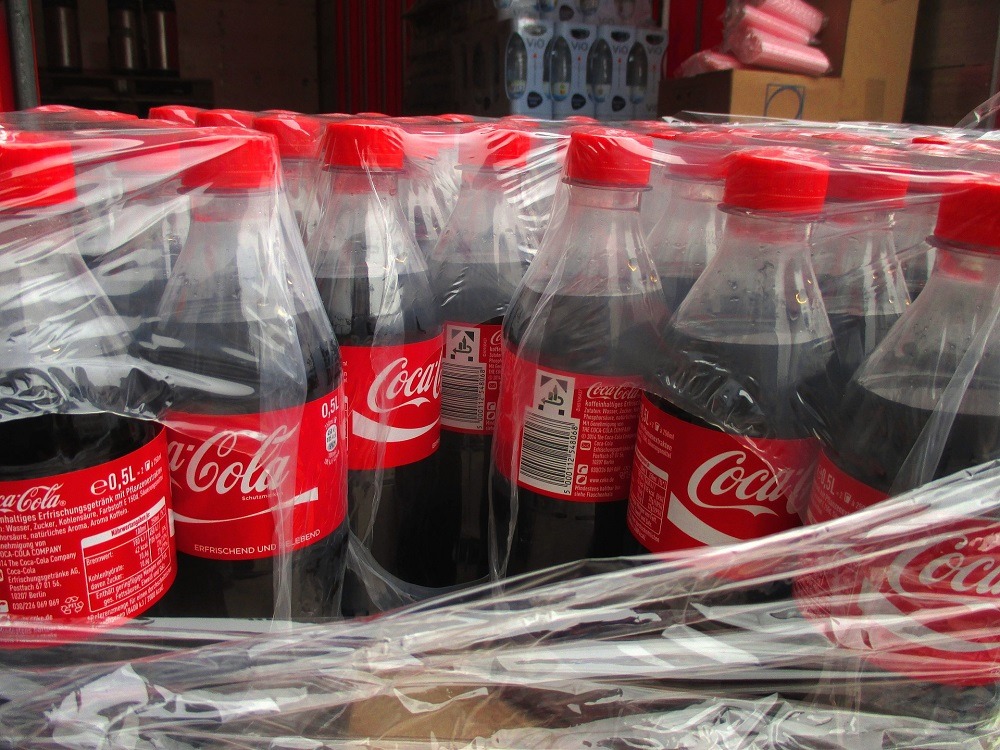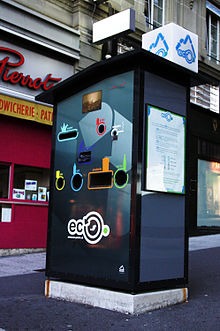Businesses and governments across the world are looking for the best way of reusing plastic water bottles, with the deposit return scheme already making an impact in about 20 countries

The British government is planning on rolling out a deposit return scheme (Wikimedia-Bidgee)
From developing new types of packaging to operating in a more circular economy, retailers and countries are working out new ways of reusing plastic water bottles.
Measures are being taken because Greenpeace estimates there are 12.7 million tonnes of plastic bottles in the ocean right now.
In March 2019, the European Parliament set a 90% collection rate target for these products by 2029, as part of its overall Plastics Strategy.
This came off the back of the EU Commission passing legislation in October 2018 that set the industry a minimum 35% recycled content target for plastic bottles by 2025.
This has been welcomed by industry leaders including Christian Crepet, executive director of Petcore Europe, a non-profit European trade association representing companies that use polyethylene terephthalate (PET), who said businesses “have been ready for 15 years waiting for it”.
Industries have also stepped up. The Coca-Cola Company, for example, has made a global commitment to collect and recycle as many bottles and cans as it sells each year by 2030.

But how do societies effectively reuse plastic water bottles? One method that some believe could be the answer is the deposit return scheme (DRS).
Many countries in Europe and the Asia-Pacific region have already implemented the system – with others, including the UK, also looking at it as a possible solution to plastic bottle recycling.
What is the deposit return scheme?
The DRS system has been commonplace in mainland Europe since the late 1980s.
It works by putting a small tax on any drink bottles that are purchased, with customers able to claim this back if the bottle is deposited at one of the scheme’s recycling sites.
In October 2017, environmental website Edie.net reported 20 countries had implemented DRS.
These were Australia, Belgium, Canada, Croatia, Czech Republic, Denmark, Estonia, Fiji, Finland, Germany, Switzerland, Hungary, Iceland, Israel, Lithuania, Netherlands, New Zealand, Norway, Sweden and some states in the US.

The first of these countries to introduce the scheme was Sweden, which set up the system for cans in 1984, before expanding this to include PET plastic bottles ten years later.
Known as Panta in the Scandinavian country, the scheme is run by Returpack Svenska AB, a business that’s privately owned by trade associations from the brewing and grocery sectors.
All the disposed bottles are sent to one of the company’s recycling facilities for reuse.
The Association of Cities and Regions for Sustainable Resource Management (ACR+) released a report in 2019 entitled Deposit-Refund Systems in Europe, for one-way beverage packaging, which analysed the ten European countries that have introduced DRS to date.
The study concluded that every country with DRS recorded a total recycling rate of between 80% and 90%.
In 2013, the EU average was 39%, according to the European Environment Agency.
UK proposal for deposit return scheme to help reuse plastic water bottles
The UK’s Department for Environment, Food & Rural Affairs (Defra) has proposed two different policies – the first using the “all-in” model.
This would not place any restrictions on the size of the drink containers in the scope of DRS, and would target a wide range of beverages – from 275ml Robinsons Fruit Shoots to three-litre Frosty Jack’s Original Cider bottles.
The second policy is called an “on-the-go” model, which would place a restriction on drink containers less than 750ml and sold individually.
Larger bottles would continue to be collected kerbside.

This policy would target beverages that are most often sold for consumption outside the home, such as “meal deal” soft drinks.
How can the deposit return scheme be effectively used in the UK?
With recycling rates statistically higher in countries that use the DRS, the UK would hope to achieve similar results.
But industry leaders are split on how best to roll out such a scheme.
Carole Taylor, chairwoman of the UK’s Local Authority Recycling Advisory Committee (LARAC), believes the DRS will work best if used for on-the-go products sold in convenience stores and bakeries.

Ms Taylor believes extended producer responsibility (ERS), which charges packaging companies for the waste they produce, is also an enticing prospect.
She tells Compelo: “Since we started talking about DRS, we’ve said it should be principally for on-the-go materials.
“We’ve done some workshops recently discussing the consultation into EPR and what we feel is that this should be implemented first to see how well it does before introducing DRS.”
Should an all-in deposit return scheme be implemented in the UK, Ms Taylor claims it could contest with the current kerbside recycling system already in place.
“They are almost like competing schemes and producers are going to have to fund both,” she says.
“If one works, why should they have to fund two schemes if they gather the same amount of recycling?
“The European DRS models came in ahead of kerbside recycling.
“However, our view is we already have a big kerbside recycling system, so it feels like we are coming in from a different position.
“And yes, of course, we would welcome more recycling – but the funding really needs to be targeted in the right places, so we can get the most out of recycling.
“What we don’t want to see is all funding to be put into DRS and it only increases the recycling rate by 1%.”

(David Mirzoeff/Greenpeace)
Greenpeace UK’s political adviser Sam Chetan-Welsh believes the all-in DRS system would be more beneficial, with the scheme providing high-quality recyclable materials.
Mr Chetan-Welsh says: “These can then be used and sold on to increase the rate of recycled content in the system.
“We see deposit return schemes as another form of producer responsibility, specifically to target these kinds of drinks containers, particularly in the context of what we have seen is an increase in production of drinks containers.
“It’s very important for us that it is the responsibility of the producers to make sure this material is collected correctly, and not just by local authorities.”
Mr Chetan-Welsh believes the all-in policy that Defra has proposed doesn’t go far enough, saying there should be no limit on the size of bottles that can be recycled through the scheme.
He adds: “Defra’s proposal has been described as all-in, but we would say it’s not quite all-in because there are materials that they exclude from the scheme.
“The stats show that in a scheme where there’s not an arbitrary limit to size, instead of a limit to the material that can be included, the net present value of the scheme is almost triple – it’s £9bn as opposed to £3bn.”
